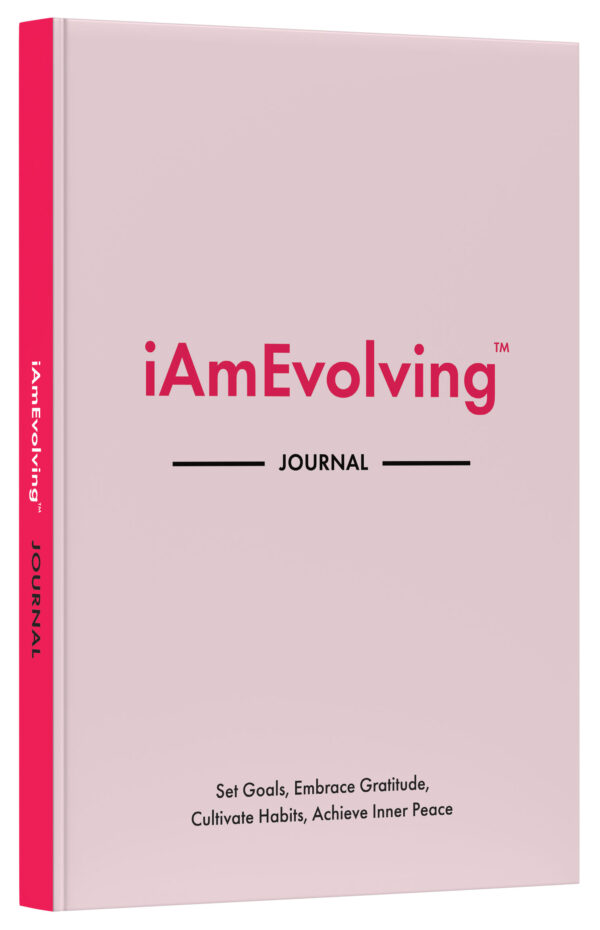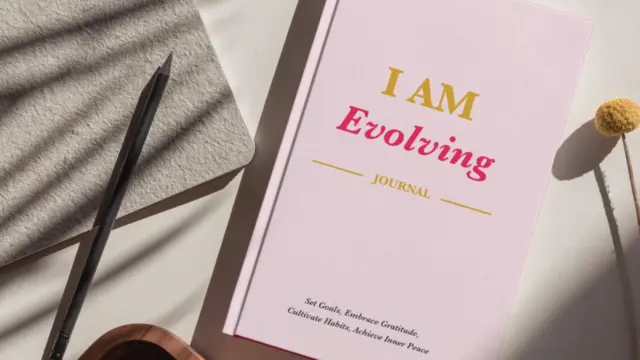Continue shopping
and explore our products below:
Table of Contents

iAmEvolving™ Journal
Set Goals, Embrace Gratitude, Cultivate Habits, Achieve Inner Peace
View JournalLiving with anxiety or depression can feel like you’re constantly carrying a weight that no one else can see. Your thoughts can spiral, emotions build up with nowhere to go, and it becomes difficult to make sense of what you’re feeling.
One simple but powerful practice that can support your mental health journey is journaling. It doesn’t require expensive tools, complicated steps, or hours of your time. Just a pen, paper, and a few honest minutes a day can help bring relief, clarity, and self-understanding.
1. Journaling Brings Emotional Clarity
When your mind is full of anxious thoughts or heavy emotions, it’s easy to feel trapped in them. Thoughts swirl and overlap, often making things feel worse. Writing them down gives them structure.
Journaling helps you separate what you feel from what you think. For example, writing “I’m feeling overwhelmed today because I have three deadlines and I’m scared of disappointing others” already untangles the emotional knot. What felt like a vague storm in your head becomes something you can look at clearly — and eventually address.
Over time, journaling builds a habit of naming your emotions and thoughts instead of being consumed by them. That act alone brings relief.
2. Journaling Helps Regulate Emotions
Anxiety and depression often come with strong emotional waves — panic, sadness, irritability, or numbness. These emotions can feel too intense to process in real time. Journaling provides a safe, private outlet to express them.
When you write freely, you’re not performing for anyone. You don’t have to explain or justify yourself. This freedom allows you to release emotional pressure, much like slowly opening a valve.
For people with anxiety, journaling can be a space to acknowledge fears without letting them dominate. For those with depression, it can be a gentle way to reconnect with emotions that may feel distant or muted.
3. Journaling Interrupts Negative Thought Loops
A major challenge in both anxiety and depression is the cycle of repetitive negative thinking. This can look like constant “what if” scenarios, harsh self-criticism, or ruminating on past mistakes.
By writing these thoughts down, you bring them into the open, where you can examine them more objectively. This process often leads to:
- Realizing some thoughts are exaggerated or not entirely true.
- Spotting recurring themes that can later be discussed in therapy or coaching.
- Reframing negative narratives into more balanced perspectives.
For example, a looping thought like “I’m failing at everything” might, when written out, turn into: “I missed one deadline this week, but I met all the others. I’m tired, not failing.”
This is not about forcing positivity — it’s about gaining perspective.
4. Journaling Increases Self-Awareness
Mental health challenges often cloud your self-perception. Journaling can gently lift that fog. By recording daily experiences, moods, triggers, and reactions, you begin to notice patterns.
Maybe you realize that anxiety spikes after social media use, or that low moods often follow poor sleep. These insights can help you make intentional changes or communicate more clearly with a therapist, coach, or loved ones.
Awareness is the first step toward meaningful growth — and journaling is one of the most effective ways to build it.
5. Journaling Encourages Self-Compassion
People struggling with anxiety or depression are often their own harshest critics. Journaling creates space for a more compassionate inner voice to emerge.
When you see your struggles laid out on paper, it becomes easier to treat yourself with the same empathy you’d offer someone you care about. Writing “I’m hurting today, and that’s okay” may seem small, but over time, this self-kindness softens the sharp edges of self-criticism.
6. Writing Reprograms Your Mind Over Time
When you write regularly — especially when you reflect on your experiences with honesty — you’re communicating with your subconscious mind.
Daily journaling reinforces awareness and gradually reshapes your internal dialogue. Over time, the way you speak to yourself begins to soften and evolve. Instead of reacting impulsively, moments of pause start to arise naturally, giving you space to choose your response. Negative thoughts that once slipped by unnoticed become easier to spot and understand. As this self-awareness deepens, your mind begins to lean toward healthier, more balanced perspectives almost automatically. What starts as a simple daily habit slowly transforms into a powerful shift in the way you relate to yourself and your experiences.
This isn’t magic — it’s the natural result of consistent, intentional reflection.
How to Start Journaling for Anxiety and Depression
You don’t need to be a “writer” to journal. Here are some approachable ways to begin:
• Free Writing
Set a timer for 5–10 minutes and write whatever comes to mind, without worrying about grammar, spelling, or structure. This is especially helpful when anxiety is high.
• Mood & Thought Logs
Each day, jot down your mood, key thoughts, and any triggers you noticed. Over time, these notes will reveal patterns you can work with.
• Prompt-Based Journaling
Use questions like:
- “What am I feeling right now?”
- “What triggered my anxiety today?”
- “What’s one kind thing I can say to myself in this moment?” Prompts give structure on days when your mind feels blank.
• Gratitude Entries
For depression, gently focusing on gratitude can be grounding. Even listing one or two things per day — a cup of tea, a kind message, a moment of sunlight — can slowly shift your emotional state.
• End-of-Day Reflection
Spend a few minutes each evening reflecting on your day: what felt challenging, what you appreciated, and what you want to release. This practice helps clear mental clutter before sleep.
👉 The goal is consistency, not perfection. Even a few sentences a few times a week can be transformative.
Support Your Mental Health with the iAmEvolving Journal
The iAmEvolving Journal is designed to support clarity, gratitude, daily habits, and inner reflection — the exact elements that make journaling so effective for mental health.
Its structured yet flexible format makes it easy to develop a regular journaling habit that gently supports your emotional wellbeing.



